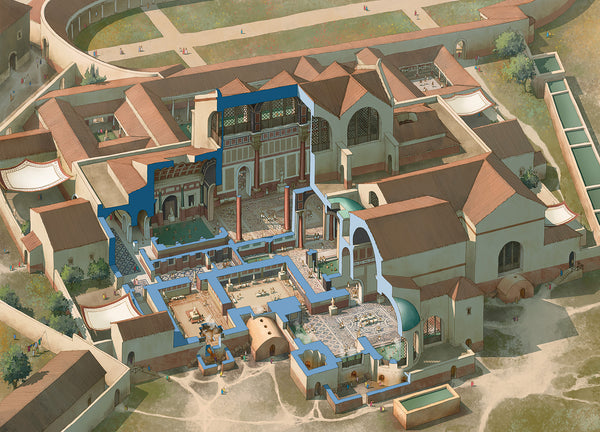Single Combat? The Duel between Heraclius and Razhadh at the Battle of Nineveh
The wars between the Byzantines and Sassanids are the focus of the latest issue of Medieval Warfare magazine. The fighting would culminate at the Battle of Nineveh, which took place on December 12, 627. It ended with a Byzantine victory, but did it begin with a single combat between the opposing leaders?

The idea of single combat - a duel between two single warriors that would decide a battle - was popular in the ancient and medieval periods, at least in literature. From David versus Goliath to Achilles against Hector, one can read many literary or legendary examples of duels being fought between champions. However, it is more difficult to find an episode that has a stronger historical-footing. Some accounts exist of single combats taking place in battles fought medieval Russia, in early Islamic warfare, and among the Samurai in Japan.
What is more rare is a medieval battle where opposing commanders engaged in a duel. This may have happened at the Battle of Nineveh, which is covered in the Sidney Dean’s article ‘Byzantium’s Pyrrhic Victory’, part of our issue Medieval Warfare VI:3. There are some accounts, from both sides of the encounter, in which the Byzantine emperor Heraclius took part in the battle, and pehaps even fought against Rahzadh, the military leader of the Sassanid army.
The most intriguing of these is the Short History of Nikephoros, which was written in the early ninth-century. Here is how Nikephoros described the Battle of Nineveh, beginning with Rahzadh challenging any Byzantine to single combat:
This man drew up his forces against the emperor and, coming forward in front of his lines, delivered challange to a duel. When Heraclius realized that none of his men would volunteer, he went forth himself against the barbarian. Being an expert archer, Rahzadh discharged an arrow which grazed the emperor’s lips. He then shot a second arrow which scraped his ankle. Now Heraclius urged on his horse, and one of his bodyguard, who was ahead of him, sliced off with his sword the shoulder of Rahzadh; and when the latter had fallen down, the emperor speared him and straightaway cut off his head. At the sight of this victory the Roman army was filled with ardor. Perceiving the emperor’s boldness, they moved energetically against the Persians, whom they utterly defeated and pursued, killing a great number of them.
Another ninth-century Byzantine writer, Theophanes the Confessor, offers a more lengthy account of the battle, and begins with Emperor Heraclius taking on three opponents:
Battle was give on Saturday, the 12th of December. The emperor sprang forward in front of everyone and met a commander of the Persians in battle, and, by God’s might and the help of the mother of God, threw him down; and those who had sprung forward with him were routed. Then the emperor met another Persian in combat and cast him down also. Yet a third assailed him and struck him on the lip with a spear, wounding him; but the emperor slew him too.
How does one evaluate these two accounts, which come from writers who lived nearly two centuries after the battle took place (but are also the most important accounts from the Byzantine side)? Add to this information the Persian tradition about the Battle of Nineveh, which explains that Heraclius was the one who issued the challenge, and despite being wounded on the lip, he fought and killed a nameless Sassanid champion.
The sources only agree that Emperor Heraclius took part in the battle, had some kind of wound on his lips, and killed someone of high rank among the Sassanid forces. Was there a single combat against the enemy commander, as one chronicler stated? That story seems doubtful, especially considering the emperor would have been around fifty-years old at time. But we can be somewhat more sure that Heraclius fought on that day, side-by-side with his Byzantine soldiers, and helped them to gain an important victory.
Read more about the battle of Nineveh and the Byzantine-Sassanid wars in our latest issue of Medieval Warfare.

